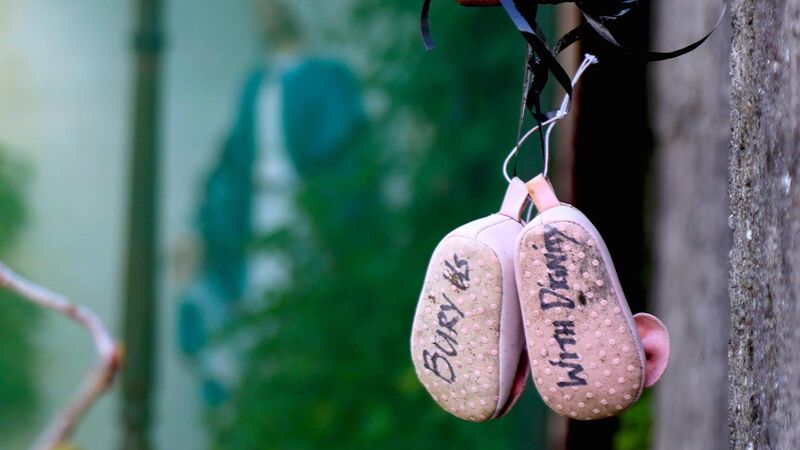The Mother and Baby Homes Commission Report: Were alternative findings possible?

A pair of baby shoes placed at the burial site at one of Ireland's mother and baby homes, in Tuam, Co Galway. Picture: Hany Marzouk
The final report of the Commission of Investigation into Mother and Baby Homes was published in January. It promised a new official understanding of the harm suffered by unmarried mothers and their children. Instead, it generated further conflict and harm.
Beginning in March, 25 academics came together using established legal methodology to rewrite the report’s executive summary — the section that summarises and justifies its findings, as if we had been the original authors.
We are experts in human rights law, family law, criminal justice, equalities and social welfare law, and histories of institutionalisation, based in Ireland, Britain, and Northern Ireland. Some have personal and family connections to homes and related institutions.
Rather than simply critique the findings, rewriting them shows that another approach was possible. We did not gather new evidence, but analysed the available evidence differently.
The commission used a narrow account of Irish legal history to excuse the abuses detailed across the report.
For those of us who teach law students, it was important to show that legal analysis was at the heart of what the commission had done, and central to much past abuse.
Our work emphasises constitutional and human rights, assessing past harms using the full legal “standards of the time” and placing unmarried mothers and their children at the core of our analysis. It is wrong to assume that no Irish laws address women’s and children’s rights until the 1970s and ‘80s. Relevant laws were in force from the foundation of the State. They were strengthened by the 1937 Constitution and the European Convention on Human Rights (1953). Successive Irish governments deliberately created the rights-based framework we applied.
It is not our invention and was not imposed from outside. When we write about a particular time period, we apply the law in force at that time.
The outcomes of any investigative process depend on the legal concepts used to analyse the evidence. By selectively avoiding discussion of individual rights, the commission excused and downplayed serious mass harms. This allowed the commission to de-emphasise State involvement, instead blaming hostile family dynamics and unreliable men for women’s and children’s suffering.
A rights-based analysis shows that the homes were sites of involuntary detention; forced and unpaid labour; inhuman and degrading treatment; failure to protect the right to life; institutional discrimination on the basis of race, religion, disability, and membership of the Traveller community; non-consensual participation in vaccine trials, obstetric violence, and more.
We have also found clear evidence of coerced and illegal adoption, and restriction of access to deceased relatives’ information.
These generate ongoing breaches of the rights to identity and family life. These findings, like the commission’s own findings, are limited and indicative; it is for the State to conduct further investigations to establish the truth in individual cases.
Primary responsibility for any human rights violations lies with the State. It funded and regulated all of the institutions examined in the report and delegated key welfare functions to them. Evidence documented in the report and in Oireachtas and local authority debates shows widespread knowledge of abuses within the homes. Yet the State did not intervene and enforce (or where necessary reform) its own laws, to vindicate women’s and chidren’s rights as citizens. State agents actively diverted women and girls into homes. For most of the 20th century, the State funded institutions instead of offering adequate financial support to single mothers. The unmarried mothers’ allowance was introduced in 1973 but was paltry and left women and children in poverty.
In identifying rights violations, we treat the anonymised testimony given to the confidential committee and reproduced in the report as evidence rather than as mere “stories”. The commission felt that this was impermissible under Irish law. We disagree.
The confidential committee testimony was anonymised, so that it cannot be reliably used to draw adverse conclusions about individual people or institutions. However, that testimony could corroborate and add weight to evidence already tested by the investigative committee, and strengthen our general, systemic findings.
This anonymity also means that we have not placed witnesses’ confidentiality at any risk. We have actively used their evidence, as many witnesses expected it would be used.
We cannot access the commission’s archives, the private records it used, or its audio recordings of witness testimony. Even if that were possible, it would be inappropriate while people are still trying to retrieve their personal data from the commission’s archives.
We have had to treat the report as our primary source and trust its account of the evidence.
Sometimes, however, this is not possible. For example, several witnesses who testified to the commission found that excerpts from the evidence appearing in the report contain inaccuracies, misrepresentations, or omissions. We decided not to quote directly from paraphrased or transcribed testimony reproduced in the report, to avoid repeating these injuries.
Some witnesses were treated so disrespectfully when giving evidence that the only appropriate remedy would be to take their testimony again, properly.
We could not discuss institutions or events outside its narrow (partly self-imposed) terms of reference. We cannot investigate individual cases or institutions, incorporate new evidence not already in the public domain, or make findings of wrongdoing against individuals or groups. We cannot provide a platform for people who testified to the commission to correct its account of their testimony. In all of these areas, we try instead to amplify the work of activists who, through litigation, writing, and public performances, are already contesting the commission’s official history.
In producing this document, the editors worked with survivor-advocates and academics, including the Clann Project, to fill gaps in our team’s knowledge and expertise. This week, we will launch our document as a draft, intending to make changes, where possible, in response to feedback from affected people and from academics. This is in keeping with a feminist ethos which values collective knowledge production.
We have not made our own proposals for legal or policy change. Any action to undo the harms of the report must be led by survivors and adopted people. Several groups have put well-researched and carefully-designed proposals to Government.
Our work contributes to public legal understanding by drawing attention to the narrow legal culture on which the report was built and modelling one kind of alternative.
Máiréad Enright, Reader in Law, University of Birmingham
Prof Aoife O’Donoghue, Law School, Durham University
Aoife Price, National University of Ireland, Galway
Clíona de Bhailís, National University of Ireland, Galway
Maria Ní Fhlatharta, National University of Ireland, Galway
Sahar Ahmed, Trinity College Dublin
Dr Aisling McMahon, Associate Professor, Maynooth University
Dr Aoife Daly, Lecturer in Law, University College Cork
Dr Ciara Fitzpatrick, Lecturer in Law, Ulster University
Dr Deirdre McGowan, Senior Lecturer, Technological University Dublin
Dr FergusRyan, Associate Professor in Law, Maynooth University
Dr Fiona Donson, Senior Lecturer in Law, University College Cork
Dr Helen Kehoe, Solicitor
Dr James Gallen, Associate Professor of Law, Dublin City University
Dr Kieran Walsh, Senior Lecturer in Law, Portsmouth University
Dr Louise Kennefick, Associate Professor, Maynooth University
Dr Lydia Bracken, Assistant Dean, University of Limerick
Dr Lynsey Black, Assistant Professor of Law, Maynooth University
Dr Maebh Harding, Lecturer in Law, University College Dublin
Dr Michelle Farrell, Reader in Law, Liverpool University
Dr Phil Mullen, Assistant Professor in Sociology, Trinity College Dublin
Dr Samantha Morgan-Williams, Lecturer in Law, University College Cork
Dr Vicky Conway, Associate Professor of Law, Dublin City University
Prof Eilionóir Flynn, Centre for Disability Law and Policy, NUI Galway
Prof Shane Darcy, National University of Ireland, Galway





